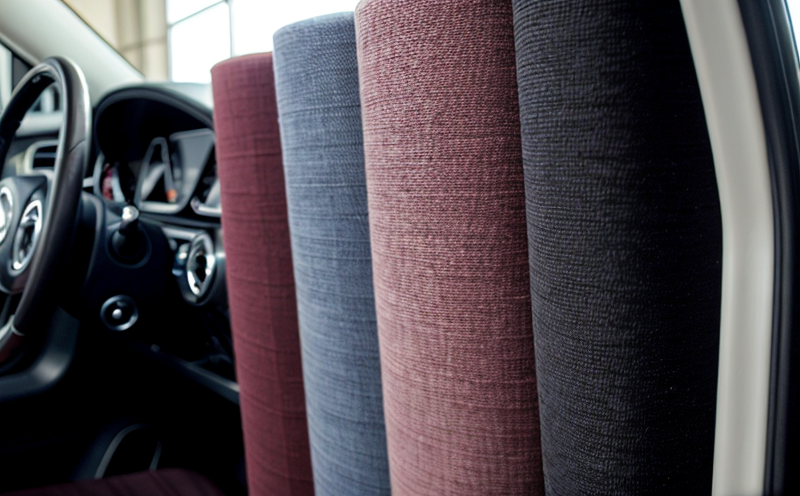Pilling resistance of textiles used in the automotive industry
The Importance of Pilling Resistance in Automotive Textiles Enhance Your Products with Eurolabs Expert Services
In the automotive industry, textiles play a crucial role in ensuring passenger safety and comfort. From upholstery to airbags, textiles are an integral part of vehicle design and functionality. However, one critical factor that often goes unnoticed is pilling resistance the ability of fabrics to resist pilling or fuzzing. In this article, well delve into the significance of pilling resistance in automotive textiles and why our laboratory services at Eurolab are essential for businesses looking to enhance their products.
What is Pilling Resistance?
Pilling resistance refers to a fabrics ability to withstand mechanical stress without developing pills or fuzz balls. Pills form when fibers break down, causing them to split and twist into small clumps. This can lead to a range of issues, including
Reduced aesthetics Pill formation can make textiles appear worn and frayed
Decreased durability Pills can weaken fabric structure, making it more prone to tears and holes
Compromised performance Pilling can affect the insulation, moisture-wicking properties, or other functional characteristics of a textile
Why is Pilling Resistance Essential in Automotive Textiles?
The automotive industry demands high-quality textiles that meet rigorous safety and comfort standards. Pilling resistance is critical for several reasons
Safety In the event of an accident, pilling-resistant textiles can help prevent injuries caused by sharp edges or loose fibers.
Comfort Pill-free fabrics ensure a smooth, even surface that provides optimal passenger comfort and reduces eye strain while driving.
Durability Automotive textiles must withstand harsh environmental conditions, including extreme temperatures, UV radiation, and chemical exposure. Pilling resistance helps maintain fabric integrity over time.
Cost-effectiveness By selecting pilling-resistant textiles, manufacturers can reduce replacement costs and minimize the need for costly rework or repairs.
Benefits of Our Pilling Resistance Testing Services
At Eurolab, we offer a comprehensive range of laboratory services to help businesses like yours assess the pilling resistance of their automotive textiles. Here are some key benefits of our testing
Enhanced product performance Our testing helps you identify areas for improvement, ensuring your products meet or exceed industry standards.
Reduced liability By demonstrating compliance with safety regulations and industry benchmarks, you can minimize the risk of product recalls and legal liabilities.
Competitive advantage Manufacturers who prioritize pilling resistance can differentiate their products in a crowded market, appealing to consumers seeking high-quality, durable textiles.
Cost savings By investing in testing services upfront, you can avoid costly rework or repairs down the line.
Key Benefits of Our Pilling Resistance Testing Services
Accurate and reliable results Our state-of-the-art equipment and expert technicians ensure precise and dependable test data
Comprehensive reporting We provide detailed reports outlining test methodologies, results, and recommendations for improvement
Cost-effective solutions Our laboratory services help you identify areas for cost savings while maintaining product quality and performance
Timely turnaround Our expedited testing options enable you to stay on schedule and meet tight project deadlines
Frequently Asked Questions (FAQs)
Q What types of textiles do you test for pilling resistance?
A We test a wide range of automotive textiles, including upholstery fabrics, airbag materials, and interior trim components.
Q How do I prepare my samples for testing?
A Simply send us your textile samples in the standard format specified on our website. Our technicians will handle all necessary preparation and testing procedures.
Q What types of pilling resistance tests do you offer?
A We provide a range of standardized and custom testing methods, including ISO 12947-1 (2006), AATCC 92 (2013), and client-specific protocols.
Q How long does the testing process typically take?
A Turnaround times vary depending on the type and complexity of the test. Our standard service takes approximately insert timeframe, while our expedited options offer faster turnaround for urgent projects.
Q Can you provide certification or documentation for compliance with industry standards?
A Yes, we issue comprehensive reports outlining test results, methodologies, and recommendations for improvement. We also provide certification documentation upon request.
Conclusion
Pilling resistance is a critical factor in the development of high-quality automotive textiles. By partnering with Eurolabs expert laboratory services, you can ensure your products meet or exceed industry standards for pilling resistance. Our comprehensive testing options help manufacturers like you identify areas for improvement and enhance product performance while minimizing costs and liabilities.
Dont compromise on safety, comfort, and durability choose the best possible textiles with confidence. Contact us today to learn more about our laboratory services and how we can support your business in achieving exceptional results.




